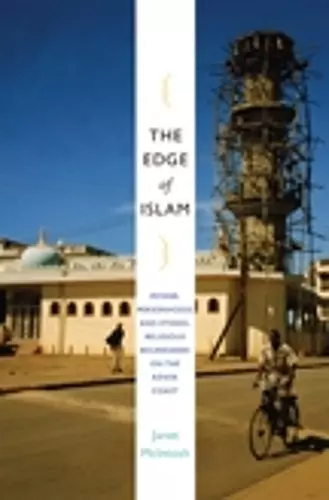The Edge of Islam
Power, Personhood, and Ethnoreligious Boundaries on the Kenya Coast
Format:Hardback
Publisher:Duke University Press
Published:29th Jul '09
Currently unavailable, and unfortunately no date known when it will be back

Explores ethnoreligious tensions in coastal Kenya
In this theoretically rich exploration of ethnic and religious tensions, Janet McIntosh demonstrates how the relationship between two ethnic groups in the bustling Kenyan town of Malindi is reflected in and shaped by the different ways the two groups relate to Islam. While Swahili and Giriama peoples are historically interdependent, today Giriama find themselves literally and metaphorically on the margins, peering in at a Swahili life of greater social and economic privilege. Giriama are frustrated to find their ethnic identity disparaged and their versions of Islam sometimes rejected by Swahili.
The Edge of Islam explores themes as wide-ranging as spirit possession, divination, healing rituals, madness, symbolic pollution, ideologies of money, linguistic code-switching, and syncretism and its alternatives. McIntosh shows how the differing versions of Islam practiced by Swahili and Giriama, and their differing understandings of personhood, have figured in the growing divisions between the two groups. Her ethnographic analysis helps to explain why Giriama view Islam, a supposedly universal religion, as belonging more deeply to certain ethnic groups than to others; why Giriama use Islam in their rituals despite the fact that so many do not consider the religion their own; and how Giriama appropriations of Islam subtly reinforce a distance between the religion and themselves. The Edge of Islam advances understanding of ethnic essentialism, religious plurality, spirit possession, local conceptions of personhood, and the many meanings of “Islam” across cultures.
“The Edge of Islam offers rare appreciation of the ways Islam, as a faith and practice, coheres across deeply fraught ethnic boundaries that inform the daily lives of Swahili and Giriama communities. . . . The Edge of Islam deftly navigates questions of Islamic authority, including distinctions between scripturalism and bodily practice, virtuous inwardness and pragmatic communalism, rationalism and madness.”
-- Flagg Miller * American Anthropologist *
“[A] sophisticated discussion of theories of spirit possession, identity, ethnicity, hegemony and ideology. . . . The book is beautifully written in a precise, clear and engaging style, and is of importance for anthropologists and political scientists as well as for students of religion.” -- Kevin Ward * Leeds African Studies Bulletin *
“This is a very good book, which I would strongly recommend, offering an effective and constructive critique of existing scholarship and a sobering insight into tensions which are very real and current" -- Justin Willis * Journal of Islamic Studies *
“It is extremely hard to do justice to this remarkable book, which is filled with excellent analysis and narratives.” -- Cynthia Brantley * African Studies Review *
"[A book with] rich and wide-ranging ethnographic knowledge [and] sophisticated theoretical ambitions. . . provocative and analytically rigorous." -- Simon Hawkins * Journal of Religion in Africa *
“Janet McIntosh's The Edge of Islam is one of the very best ethnographies of East Africa to emerge in the past ten years. . . . [T]hought-provoking, interesting, and original.” -- James Smith * Journal of the Royal Anthropological Institute *
"[A] highly welcome contribution. This innovative and invigorating book provides invaluable insights to the highly complex interplay between religion and ethnicity." -- Terje Østebø * African Studies Quarterly *
“McIntosh’s account has a sharpness of focus and forcefulness of approach that is an improvement over much that has been published on religion andvalues in this area. . . . [T]his is a book well worth reading. . . . [An] excellent study, a valuable contribution to our understanding of the East African coast.” -- T. O. Beidelman * Anthropos *
"[A]n exhilarating ethnography. . . [which] reconfigures our understanding of Islam on the Swahili coast.” -- Kate Kingsford * African Affairs *
“Very original…very skillful…likely to inspire many other anthropologists working on religion, [and] a ‘must read’ for anthropologists of religion in Africa.” -- Ramon Sarro * Islamic Africa *
"The 2010 winner of the Clifford Geertz Prize in the Anthropology of Religion was The Edge of Islam: Power, Personhood, and Ethno-religious Boundaries on the Kenya Coast . . . a sophisticated and highly accessible analysis [that] infuses fresh insight into such well-worn concepts as hegemony, ideology, syncretism and personhood, while at the same time rethinks questions relating to conversion, possession, and the margins of Islam. . . . Commented one member of the jury, McIntosh was the most subtle and engaging study of the entanglements of categories of ethnic and religious identifications that I've read. . . . Clifford Geertz would have approved of this choice for many reasons, but perhaps most of all because it is written in such elegant but straightforward prose." -- Sue Kenyon * Anthropology News *
ISBN: 9780822344964
Dimensions: unknown
Weight: 494g
344 pages